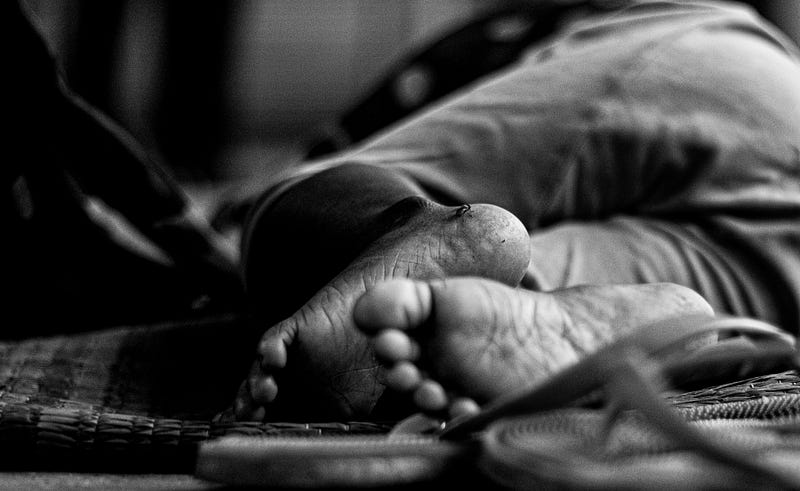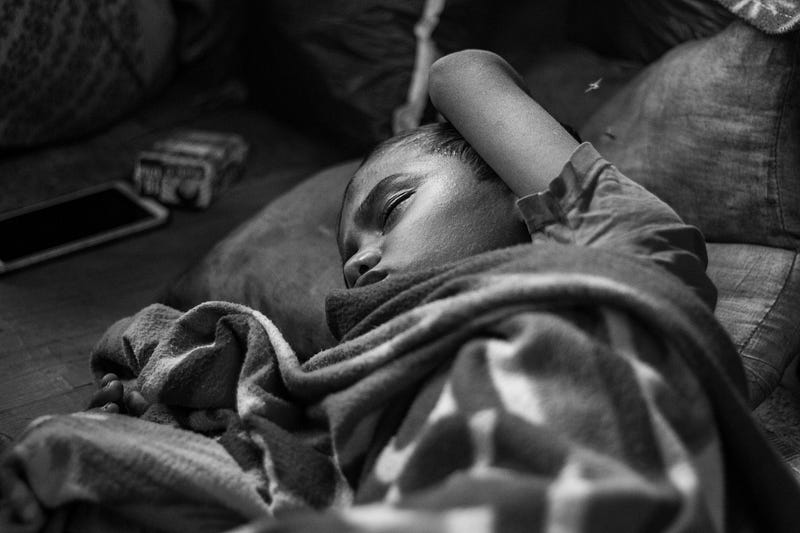COVID-19 Lockdown and Resilience: Narratives from the Ground

Nasreen (name changed) is a domestic worker who has lived on the streets of Mumbai for many years. Though living with a heightened sense of vulnerability has always been a part of what ‘normal’ means to her family, her feeling of uncertainty during the lockdown is further compounded by the constant struggle to make herself and her family’s needs ‘visible’ to the state, society and anyone who is willing to listen and help.
When the lockdown was announced, Nasreen’s employer called her and asked her to stop coming to work until things ease again. She didn’t speak about whether Nasreen would be receiving her salary for the coming months. It was implied that she wouldn’t be given her salary or any form of financial support. Nasreen’s employer didn’t even ask her about how she would manage to take care of her family during lockdown. As she says,
‘It’s been two months now and she hasn’t even wondered about how I am surviving and taking care of my household and children. No phone call, nothing.’
Meanwhile, to make ends meet, Nasreen’s children go begging on the streets everyday to bring some money back home. Nasreen, like most mothers, is deeply concerned about her children’s safety and health, but also feels like this is their only option for survival. To make sure that her children don’t get sick, Nasreen tries to keep their surroundings very clean and ensures that her children wash their hands and cover their mouths as much as possible.
Before the lockdown, Nasreen used to buy water for her family. Right now, Nasreen tries to collect water from a nearby building when no one is noticing. She knows that the security guards and people of the building complain when she takes water from there, but she has no other option and does what she can to help in their survival.
Nasreen and her family cannot afford to use the public toilet everyday. Even though the Municipal Corporation of Greater Mumbai (MCGM) has declared that using a toilet shouldn’t require a fee during lockdown, the manager of the public toilet insists that she pays INR 5 every time she needs to take a bath and INR 2 to use the toilet. Given that she has to pay INR 10 whenever she wants to change her clothes, Nasreen and her children just change by hiding behind cars. As a woman, Nasreen tells us that she feels unsafe having to deal with the denial of privacy in so many ways. However, she needs to take such risks to be able to continue living each new day.
Early during the lockdown, the police tried to beat up Nasreen’s family and asked them to stop living on the streets. ‘Policemen come at night and wake us up. They ask who we are and where we have come from. We tell them that we are from here only, we have lived here all our lives’, she said. Currently, the police have stopped threatening them and instead, have been offering useful advice on how she can safeguard the health of her family to avoid contracting COVID-19. However, when middle-class persons see her living on the streets next to a local shop during the pandemic, they tend to have insensitive reactions to Nasreen and her family. Nasreen further explains this when she says, ‘They shoo us away. We tell them that we live on the road, where can we go? They still tell us to leave. But where will we go? We don’t have homes.’
While highlighting the need for the government to protect the homeless and other vulnerable populations, Nasreen says, ‘Nothing will happen to people living in big houses. They will continue living in the same way. The government needs to think about how people like us, people living on the streets, can be helped.’
As narrated to Amritlal Betwala, Pooja Yadav and Bala Akhade; written by Sneha Tatapudy.

नसरीन (बदला हुआ नाम) एक घरेलू कामगार है जो कई सालों से मुंबई की सड़कों पर रहती है. हालाँकि, उनके परिवार के लिए ‘सामान्य’ कही जा सकने वाली ज़िंदगी में असहाय होने की स्थिति बनी रही है, लेकिन लॉकडाउन के दौरान उनकी अनिश्चितता की भावनाओं को वो अपने जीवन के लगातार चल रहे संघर्षों के साथ जोड़ कर वो सरकार, समाज व जो भी उनकी बात सुनने व सहायता करने के इच्छुक हैं, उन्हें बताना चाहती है.
जब लॉकडाउन की घोषणा की गई थी, नसरीन के मालिक ने उसे फोन किया और उसे फिर से स्थिति सामान्य होने तक काम पर आने के लिए मना किया. उसने इस बारे में बात नहीं की कि क्या नसरीन को आने वाले महीनों के लिए उसका वेतन मिलेगा. यह निहित था कि उसे उसका वेतन या किसी भी प्रकार की वित्तीय सहायता नहीं दी जाएगी. नसरीन के घर मालिक ने उससे यह भी नहीं पूछा कि वह लॉकडाउन के दौरान अपने परिवार की देखभाल कैसे करेगी. जैसा कि वह कहती है,
‘अब दो महीने हो गए हैं और वह इस बारे में सोंच भी नहीं पा रही है कि मैं कैसे जीवित हूं और अपने घर और बच्चों की देखभाल कैसे कर रही हूं. कोई फोन नहीं, कुछ भी नहीं.’
इस बीच, दो वक़्त की ज़रूरतों को पूरा करने के लिए नसरीन के बच्चे कुछ पैसे वापस घर लाने के लिए रोज सड़कों पर भीख मांगते हैं. अधिकांश माँओं की तरह नसरीन भी अपने बच्चों की सुरक्षा और स्वास्थ्य के बारे में गहराई से चिंतित हैं, लेकिन वो यह भी कहती हैं कि यह उनके ज़िंदा रहने का एकमात्र विकल्प है. यह सुनिश्चित करने के लिए कि उसके बच्चे बीमार ना पड़ें, नसरीन अपने आस-पास के वातावरण को बहुत साफ रखने की कोशिश करती है और यह सुनिश्चित करती है कि जितना संभव हो सके उसके बच्चे अपने हाथों को धोएं और मुंह धोएं.
लॉकडाउन से पहले, नसरीन अपने परिवार के लिए पानी खरीदती थी. अभी, नसरीन पास की एक इमारत से पानी इकट्ठा करने की कोशिश करती है, जब कोई ध्यान नहीं देता है. वह जानती है कि जब वह वहां से पानी लेती है तो सुरक्षा गार्ड और इमारत के लोग शिकायत करते हैं, लेकिन उसके पास अपने व परिवार के अस्तित्व को बचाने में कोई दूसरा विकल्प नहीं होता है.
नसरीन और उसका परिवार हर रोज सार्वजनिक शौचालय का इस्तेमाल नहीं कर सकता. भले ही ग्रेटर मुंबई नगर निगम (MCGM) ने घोषणा की है कि लॉकडाउन के दौरान शौचालय का उपयोग करने के लिए शुल्क की आवश्यकता नहीं होगी, सार्वजनिक शौचालय के प्रबंधक का कहना है कि वह हर बार स्नान करने के लिए 5 रु व शौचालय के उपयोग के लिए 2 रु भुगतान करने की आवश्यकता है. यह देखते हुए कि जब भी वह अपने कपड़े बदलना चाहती है, उसे 10 रु का भुगतान करना पड़ेगा, नसरीन और उसके बच्चे बस-कारों के पीछे छुपकर बदलते हैं. एक महिला के रूप में, नसरीन हमें बताती है कि वह इतने सारे तरीकों से निजता के हनन से असुरक्षित महसूस करती है. हालांकि, उसे हर दिन जीवन जीने के क्रम में ऐसे जोखिम उठाने की जरूरत है.
तालाबंदी शुरुआती दिनों के दौरान, पुलिस ने नसरीन के परिवार के साथ मारपीट करने की कोशिश की और उन्हें सड़कों पर रहने से रोकने के लिए कहा. उसने कहा, ‘पुलिसवाले रात को आते हैं और हमें जगाते हैं. वे पूछते हैं कि हम कौन हैं और कहां से आए हैं. हम उन्हें बताते हैं कि हम यहीं से हैं, हमने अपनी सारी जिंदगी यहीं गुजारी है.’ वर्तमान में, पुलिस ने उन्हें धमकी देना बंद कर दिया है और इसके बजाय, इस पर उपयोगी सलाह दे रही है कि कैसे वह COVID -19 से बचने के लिए अपने परिवार के स्वास्थ्य की रक्षा कर सकती है. हालाँकि, जब मध्यवर्गीय नागरिक उसे महामारी के दौरान एक स्थानीय दुकान के बगल में सड़कों पर रहते हुए देखते हैं, तो वे नसरीन और उसके परिवार के प्रति असंवेदनशील प्रतिक्रिया देते हैं. नसरीन आगे हमें समझाते हुए बताती है कि ‘वे हमें दूर भगाते हैं. हम उन्हें बताते हैं कि हम सड़क पर रहते हैं, हम कहां जा सकते हैं? वे फिर भी हमें छोड़ने के लिए कहते हैं. लेकिन हम कहां जाएंगे? हमारे पास घर नहीं हैं.’
बेघर और अन्य कमजोर आबादी को बचाने के लिए सरकार को किए जाने वाले आवश्यक कार्यों पर प्रकाश डालते हुए नसरीन कहती हैं, ‘बड़े घरों में रहने वाले लोगों को कुछ नहीं होगा. वे उसी तरह से जीते रहेंगे. सरकार को यह सोचने की जरूरत है कि हमारे जैसे लोग, सड़कों पर रहने वाले लोगों की मदद कैसे की जा सकती है.’
अमृतलाल बेतवाला ,पूजा यादव,बाला अखाड़े और स्नेहा टाटापुडी का योगदान.अंकित झा द्वारा अंग्रेजी से अनुवादित.
Catch up on the other campaign stories: #1,#2, #3, #5, #6, #7, #8, #9, #10, #11, #12, #13
‘COVID-19 Lockdown and Resilience: Narratives from the Ground’ is a series through which we are showcasing community voices and experiences in lockdown, people’s resilience and the continued struggle for their rights. Stay tuned!


